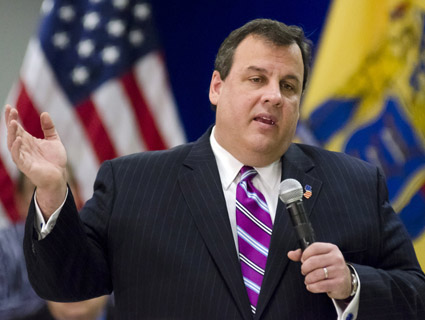
<a href="http://www.flickr.com/photos/bobjagendorf/5492860578/">Bob Jagendorf</a>/Flickr
Yesterday, Gov. Chris Christie (R-N.J.) announced plans to withdraw his state from the Regional Greenhouse Gas Initiative (RGGI)—a cap-and-trade system designed to reduce carbon dioxide emissions 10 percent by 2018—fueling new speculations about his national political aspirations. It also raises questions about the long-term survival of voluntary cap-and-trade programs. As Emilie Mazzacurati, a Thomson Reuters Point Carbon market analyst, told the New York Times, “the direct impact” of Christie’s decision “is going to be minimal…The question is, will other states follow?”
Because of that question, Jeff Tittel, director of New Jersey’s Sierra Club chapter, calls the decision an “environmental disaster.”
Under RGGI (pronounced “Reggie”), participating states set a limit on power plants’ emissions and make them buy credits that they can exchange in order to emit specific amounts of greenhouse gases. Utilities with emissions under the limit get to sell their extra credits at quarterly online auctions.
New Jersey had been one of 10 Northeastern and mid-Atlantic states in the regional program, and is the first to pull out. But at a press conference, Christie said he remains “completely committed” to the environment and criticized RGGI as an ineffective program that unfairly taxes electric utilities and citizens alike. He also released a statement listing 21 environmental actions undertaken by his administration.
“I think his statement yesterday had so much hot air it should be regulated by RGGI,” says Tittel.
As evidence, Tittel points to Christie’s efforts to drain millions of dollars from environmental programs, including $158 million from the Clean Energy Fund, to pay off the state’s $11 billion budget deficit; and New Jersey’s recent withdrawl from a multi-state lawsuit seeking to cut the greenhouse gas emissions of five major utilities.
Politically, he says, Christie is “trying to have it both ways,” presenting himself as a green energy advocate to New Jersey residents while appealing nationally to the Tea Party crowd. (Americans for Properity, cofounded by Tea Party billionaire David Koch, has actively attacked RGGI as an example of excessive taxation.)
“I think he wants to be on a national ticket, whether it’s number one or number two,” Tittel says. “I’m not sure he’s running [for president], but he will be a top choice for vice president.”
That’s consistent with speculation that Christie may run for president to fill a void in an uninspiring Republican field, something that the governor has repeatedly denied. (Christie’s office did not immediately return a call from Mother Jones seeking comment.)













